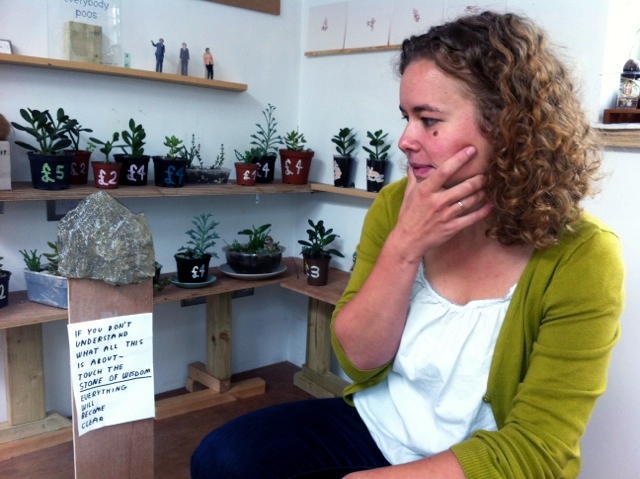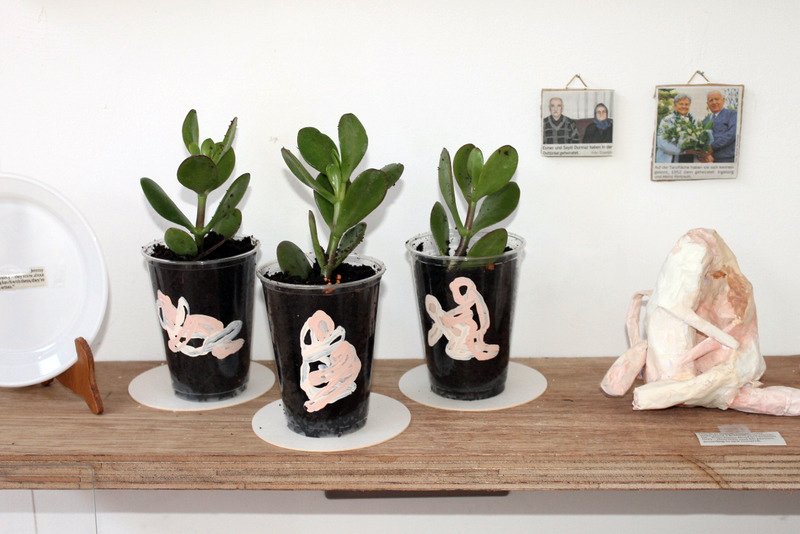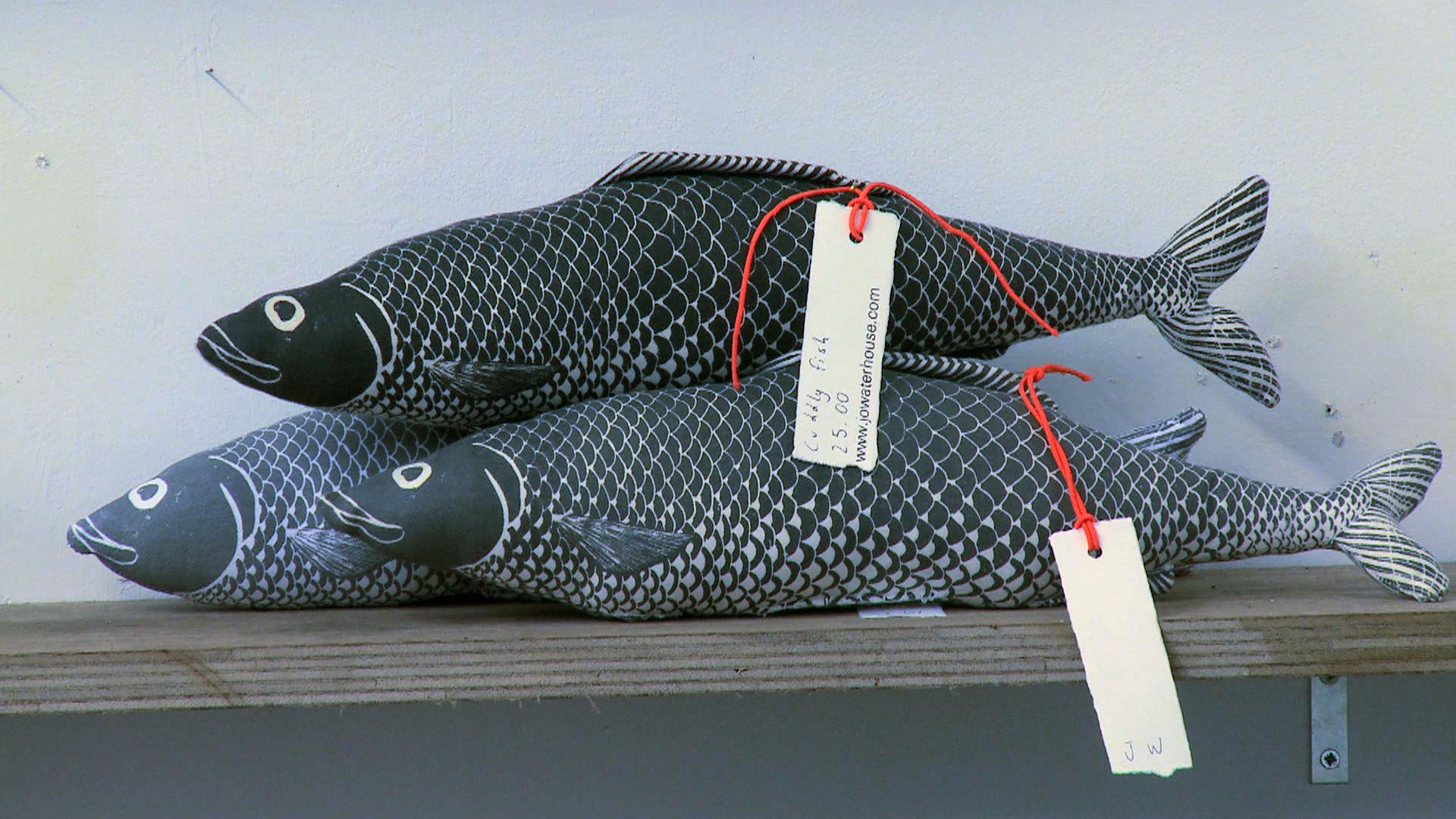Making a life work of playing with reality

In a converted garage at the end of a mews in Tulse Hill, South London, Rosalie Schweiker has her studio. Crudely made furniture rubs shoulders with figurines, tie-dyed socks and pots of avocados she has grown from their stones.
Schweiker was born in Zurich in 1989, the second of four daughters. Her father was an engineer, her mother a landscape gardener. When she was about to start school, the family moved to Heilbronn in the German state of Baden-Württemberg because of her father’s work.
A disclaimer is needed here. Schweiker disdains conventional biographical details like ages, dates, education and career. All are a moveable feast. She deliberately posts her details on Wikipedia for anyone to edit. What you are about to read is one version of the Schweiker story but it is by no means the only narrative.
“For a lot of artists, the issue of control is really vital,” she says. “I’m trying to find mechanisms like Wiki where I give up control and authorship.”
“I find it quite ridiculous how the art world functions in many ways,” she adds. “It’s based so much on which college you went to and it’s all about these symbolic things.”
“I’m trying to undermine that. If somebody wants to work with me, I want them to work with me because of what I do.”
“Why would it change my work if you know that I was born in 2003? It is the same thing with where you’re born and where you’re from. Any artist can tell you their life story. I think it’s more productive to be more playful with these things.”
Participation
Playful is a word which figures prominently in Schweiker’s vocabulary along with social engagement and participation. She organises conferences on how to figure things out with the help of potatoes or lessons to be learnt from avocados. She awards herself prizes.
Participation is important, she feels, when so many people are huddled over their laptops and not necessarily meeting face-to-face.
“A lot of the stuff I am doing now creates a situation where people can actually say hello to each other. It’s about being somewhere and feeling that you belong to a place and a group of people as well.”
“I think what I do is I create situations and contexts in which things happen that wouldn’t usually happen. I create structures in which people can meet that haven’t met before and have exchanges that they wouldn’t usually have.”
“When I do work and people laugh, I’m really happy. You don’t get a lot of laughter in art galleries.”

Nomad
Schweiker took her undergraduate degree at Dartington College of Arts in Devon before heading to London for a Fine Art MA at Camberwell College of Art.
Interspersed throughout her fledgling career have been residencies in Finland, Germany and Singapore.
Her decision to stay in London was driven largely by the offer of a free studio from Space Station Sixty-Five, an artist-run gallery space. The three-year tenure runs until 2015.
Schweiker says she doesn’t really feel attached to any particular country though she has enjoyed recent forays back to Switzerland including a teaching spell at the Swiss Federal Institute of Technology Zurich and an exhibition in Bern.
“I don’t really feel Swiss. I don’t feel British either. I don’t think it actually matters that much anymore.”
Art, she adds, should be challenging such categories and stereotypes.
“It’s the same with men and women and how that still impacts. I’ve done stuff under different names as a man and it is perceived differently.”
“It’s different if I just use my surname so people don’t know which gender I am. It really impacts what they might think about it.”
Rosalie Schweiker
When people stumble upon something and are surprised, I think that’s art. In a way the confusion that you want to create is really important for me
Struggle
Like many young artists, Schweiker has struggled to make ends meet. To boost her income, she sells flowers, does tarot readings, teaches at art colleges and organises events. Her website tells a slightly different story.
“I earn a fortune with tarot readings,” it says. “Since 2008, I’ve also been subsidising my work by running a profitable sex shop…”
“A colleague and I often joke that we do art for blind people,” Schweiker explains. “Because our work exists in descriptions, stories and rumours rather than visual material.”
“In traditional art you are communicating through objects. You can’t express something, which is why you try to represent it visually. Hopefully a person sees it and has some sort of response.”
“We are playing with reality. We don’t try to manipulate material like wood or bronze. We are manipulating situations in a way.”
The Stone of Wisdom occupies pride of place in her studio. It’s a stone covered in glitter, bearing the message: “If you don’t understand what all this is about, touch the stone of wisdom. Everything will become clear.”
She describes it as her signature piece, taking something normal and giving it another name, investing it with different qualities.

More
Welcome to Rosalie’s studio
Pranks
“The Stone of Wisdom is my take on the idea that art needs to be explained all the time, that you give something significance by talking it up.”
Ideas, pranks, conversations. These are the immaterial forms of Schweiker’s work.
“What’s the purpose of this art thing?” she asks. “It’s because you want to make people think differently.
“When people stumble upon something and are surprised, I think that’s art. The moment of why is she doing that, what’s the point in that? In a way the confusion that you want to create is really important for me.”
Besides wanting her art described in plain language, she wants her work to be useful, relevant to her local community.
“I quite like long term projects,” she says. “I don’t believe in an artist parachuting in somewhere and just doing stuff. I like things to develop over a long period of time.”
Before I leave, I can’t resist asking about the avocado obsession.
“Avocados look quite gross for a long period of time,” she says. “They get a bit mouldy and you want to throw them out but you don’t because you believe in them and then suddenly they sprout and that’s a bit like how artists work sometimes with ideas. You have all these little pots where you put your avocado cores or ideas and just let them mould. Some of them sprout and some of them don’t.”
Schweiker hands me her business card. I don’t look at it closely until I’m back home. The offer is irresistible.
Artist Rosalie Schweiker will swap jobs with you for any period of time. To discuss things further, please email Rosalie.Schweiker@gmail.com.
September 26, 1989: born in Zurich
1995/1996: moves with family to Heilbronn, Germany
2007: attends Dartington College of Arts in Devon, Britain
2010: undertakes Fine Art MA at Camberwell College of Art
2012-2015: studio in Tulse Hill, South London
I think being a Swiss artist has been a major advantage for me; it opens a lot of doors and gives me opportunities that I would otherwise not have had access to.
Maybe because I have been living abroad now for some time, l feel it’s strange to profit from something that one has no involvement in, after all nobody chooses where they are born. So sometimes the privilege of being Swiss makes me feel like ‘a very lucky bastard’ as they say here.
Rosalie Schweiker

In compliance with the JTI standards
More: SWI swissinfo.ch certified by the Journalism Trust Initiative
You can find an overview of ongoing debates with our journalists here . Please join us!
If you want to start a conversation about a topic raised in this article or want to report factual errors, email us at english@swissinfo.ch.